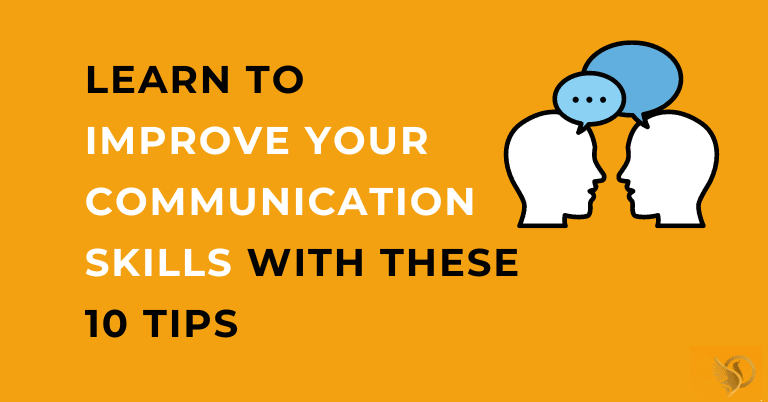Communication is one such soft skill that is of no use if you are not able to present it clearly in front of an audience. It not only helps us to build several personal and professional relationships but never makes us appear more connected and involved in social settings.
Have you ever been rejected for some role or position even after having the required skills but not the capacity to communicate them properly? It is one of the most common yet serious issues people face and the reason being they don’t know how to master communication.
To maintain long-term personal relationships and professional partnerships, you require the ability to express yourself clearly and confidently while interacting, which can benefit you in a number of ways. Let’s explore the top 10 ways through which you can improve your communication skills:
1. LISTEN ACTIVELY
Actively listening translates as keeping an open mind with a wider perspective to soak in whatever is being spoken out loud. Listening and hearing are not similar, not at all. To understand the sound, interpret, analyze, retain, and respond to the content delivered by the speaker is listening, but the ability to perceive the sound is hearing.
Listening plays a major role in communication. In order to communicate properly and effectively, you need to listen properly. So, just be patient and listen actively.
You can further ask the other speaker open-ended questions to become more understanding about what the speaker has to say and also to make them aware of your interest and concern about the topic. Summarizing the topic to clarify that you have listened to the right points is also an effective way to show the speaker that you have paid attention. It also encourages them to keep the conversation going as they learn about the curiosity of the listeners.
2. BE MINDFUL OF YOUR BODY LANGUAGE
Body language plays a major role while communicating. It helps us to understand and decode what the other person is saying. It includes our posture, hand gesture, and movements. It is a way to communicate without words that are subconsciously read by the other person and affect their body language to either become positive or negative.
Most of the time, when you are not communicating through words, your body language says it all and leaves an impact on the viewers. One such example of this is keeping your arms crossed when speaking or listening to others.
Many people take the pose as the power pose or a dominant position, triggering or threatening them, resulting in your image appearing stiff and arrogant. The other person may judge you on the basis of such postures. So, be careful of how your body speaks while communicating.
3. TAKE NOTES
Taking notes allows you to record the oral information and you can conveniently access it whenever you want to. It also helps keep you focused on the subject by avoiding distractions.
Also, it is an effective way of keeping specific and detailed information in the form of notes with you to keep the information handy. If you want to make sure that there is no miscommunication, taking notes is the right solution. The speaker also feels respected and heard and hence making communication effective.
4. MAINTAIN THE QUALITY OF YOUR TONE AND VOICE
While communicating, it is important to have an appropriate tone and audible voice as it translates the information beyond the words. It expresses your attitude, feelings, and familiarization with the topic you are speaking about.
Using the right tone will result in conveying your message in a relevant way; otherwise, it can be wrongly interpreted if you are not mindful of your tone, intonation, and voice.
5. GIVE SPACE TO OTHERS
As mentioned earlier, good communication skills also require you to be an active listener and listen patiently when someone else is speaking. Many people have this habit of interrupting while someone is speaking.
An individual with good communication skills lets others put their points across, allowing him or her to express their thoughts and ideas properly and also listen actively and carefully to what the other person has to say.
The opinions related to the context someone else is speaking can differ, but a good communicator always puts their opinions, thoughts, and ideas aside while someone else is speaking but express their ideologies once the speaker is done. This allows the other person to feel respected and appreciated while speaking resulting in a positive environment.
6. MAINTAIN EYE CONTACT
Eye contact is an important element of communication. As per a joint study between the University of Wolverhampton and the University of Stirling, it has been found that if you want people to remember what you said long after you are done talking, maintain good eye contact. Eye contact tends to make you look honest.
Also, it is an effective way of reading facial expressions. Maintaining proper eye contact makes you look confident and increases interaction. But due to anxiety, lack of confidence, and shyness, people avoid eye contact and end up making others bored and uninterested. So, try to maintain proper eye contact.
7. USELESS FILLER WORDS
Filler words prove useful while speaking as it allows the speaker to pause and consider what to say next. But they do not add anything to your message. Overusing filler words like ‘umm, ‘err,’ ‘like’, and ‘uh’ makes your communication boring and less effective. So, try to use fewer fillers and better replace them with a quick pause.
Moreover, avoid non-sensical information. Words without meaning not only consume the precious time of your listeners but also divert their minds into not being focused on what you have to say. It is important to keep the communication concise and to the point so that you get the undivided attention of your listeners.
8. KEEP YOUR AUDIENCE ENGAGED
In order to better convey your message directly to your audience in the dialect that they understand, it is crucial for any communicator to know their audience’s style, preferences, and interests.
Let’s say you are communicating with a senior person or a colleague, and it is understandable enough that informal language will not be used in such a case. If you are communicating with someone of younger age, you can use informal language and even the modern acronyms that he/she will understand, but you cannot use those modern acronyms while communicating with a group of senior citizens as they might not understand.
In addition to that, you can be more conscious about the style of your story to make it seem more relatable. For example, you can add a personal story that many people can quickly relate to. This way, you can make room for the audience to feel more connected and interested in whatever you have to say.
9. KEEP YOURSELF CALM AND COMPOSED
When you are about to present something, regardless of the number of people that are listening, you must stay calm and collected attitude. Being too loud or too soft can be misleading to the audience, who will not take a minute to feel distracted.
Communication must be in a polite tone, with the right state of mind. Starting off tired, drowned, frustrated, or sad can instantly turn off the audience on what you have to say if it might even be for their own good.
A good communicator always maintains a pace while expressing their deepest personal feelings and thoughts. Although sometimes it can be a bit difficult to control your heart from pounding stubbornly without catching a break, in such a situation, it is a better option to take a break to calm yourself down. Taking a small break does not hinder the continuity but also allows the listeners to let the intense words soak in.
10. BECOME MORE SELF-AWARE
An individual with advanced communication skills is always someone who is deeply self-aware and has a good hold of their own emotions. It is important for a communicator to not discourage the audience by imposing your own emotions onto them; instead, allowing them to feel whatever they want can have a greater impact on your speech and you as a communicator.
The theme of self-awareness begins from here, which reflects your personality as a communicator like just another normal human, which can be wrong and emotional at times. It also helps you in your personality development. It also enables the listeners to connect to your story deeper while still having integrity and respect toward your words.
Conclusion
Communication is surely the key to the success of any personal or professional relationship, but only when it is done right. As effective communication can strengthen your relationships, a small mistake in your tone and style can create a knot in your relationships and can even destroy them completely.
And with that, we end our article best 10 tips on improving your communication skills that we hope you have found useful. If you still find yourself struggling to practice communication or wish to reach the advanced level, you can seek out professional mentors and coaches to explore more.


